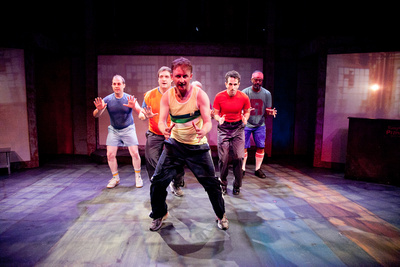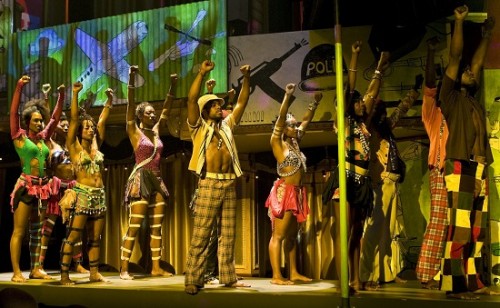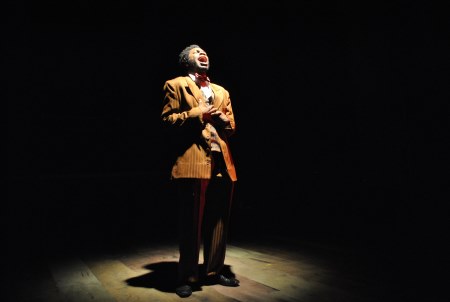|
JACQUELINE LAWTON: Why did you decide to get into theatre? Was there someone or a particular show that inspired you?
VICTORIA DURHAM: I have a degree in Film and Media Arts. For years I worked in video production in various capacities, but always felt slightly unfulfilled in my work. I remember going to see a friend perform in a Fringe show and suddenly the light bulb went off in my head. Theatre offers something raw, organic and unfiltered that movies do not. The live component of watching something occur in real time is exciting. There’s a bravery in it that I find deeply inspiring. JL: How long have you lived and worked as a theatre critic in D.C.? What brought you here? Why have you stayed? VD: I’m originally from the DC Metro area. I attended college in Philadelphia, but decided to return home to work in video production. There were just more opportunities in that field here than there were in Philadelphia at the time. That was over ten years ago. Before I decided to seriously pursue a career in theatre, I actually considered moving to the west coast. However, I changed my mind when I realized that Washington’s theatre scene is one of the strongest in the country. I’ve only been a theatre critic for a little over a year, but let me tell you, DC’s vibrant arts scene has kept me very busy. JL: How do you define the work you do? Specifically, what is the role of the theatre critic in the world of theatre? What contribution do you hope to make in the D.C. Theatre community and the American Theatre? VD: The role of the theatre critic is to speak for the audience, to let theatre makers know what people think of their work. I really want to be known as an intelligent and thoughtful who critic who sought to help theatres do their absolute best work. I want my critiques to remind theatre companies and playwrights to create conscientious work that accurately reflects the diversity of the world around them. JL: If your work as a theatre critic doesn’t pay the bills, what else do you do? How do you balance this work with your play viewing and criticism? VD: One of these days I’ll figure out how to turn my work as a theatre critic into a full-time paying gig. For now I work as an account manager at a trade litigation consulting firm by day. I am however, contemplating getting a job at a local theatre. I’d like to immerse myself into that world a bit more. Still, it isn’t difficult to balance play viewing and criticism with my current occupation. The theatres in DC are extremely accessible. Occasionally I’m forced to sacrifice a few hours of sleep in order to get a review written on time, but hey, that’s the gig. JL: What skills and traits do you feel a successful theatre critic should have when writing about theatre, especially when it comes to new plays? VD: I think that good theatre critics lead broad and diverse personal lives. You’ll write better informed critiques that way. Being open-minded, culturally informed and detail oriented make for a strong critic as well. A good critic also notices what the casual viewer doesn’t. He/she sees the subtleties, nuance, etc. of a work. JL: What is your writing and viewing process? Do you read the script prior to seeing a production? Do you research the author and/or world of the play? Do you read the program notes? VD: I don’t read scripts prior to seeing a production. If the playwright and producing theatre have done their jobs, then I won’t need to do so. But I definitely read program notes and often research a play’s background, context, history, etc., especially if the subject matter is unfamiliar to me. A great example is the play, “Copenhagen,” by Michael Frayn. At its core, the story is about human relationships and the precariousness of memory. Yet there is a lot of scientific terminology included in the script because the characters are nuclear physicists. I had to give myself a little refresher course in Chemistry 101 just so I could keep pace with the plot and dialogue. When a play begins, my first objective is just to get the gist of who the key players are and to get a general sense of the plot. After that I allow myself to notice the production’s creative and technical elements, ie. set design, costumes, sound, etc. It’s not until I’m sitting alone with my laptop that I consider the play’s theme, cultural relevance, timeliness or even if I liked the show. I definitely need a minute to digest the material before I begin writing. JL: In the article, “Ohio Critic's Tough Words Elicit Rough Reaction,” Denver Post Theater Critic John Moore states: “There is no universal rule book for criticism, no how-to manual. My guidelines: Be true to your visceral emotional response, good or bad. State your case and back it up. Be a catalyst for discussion. Encourage dialogue. Don't be personal. Never try to be funny at the expense of someone's feelings.” What guidelines, rules or standards do you have for your own work? Have you always upheld them? If so, at what cost? If not, what shifted the line for you? VD: I work very hard to ensure that my reviews are written with great tact, respect and sensitivity – no brash and discourteous commentary, EVER. Even if I hate a show, I’ll state my opinions respectfully and will give concrete examples to back up my critique. I’m not here to kill dreams or to lambast anyone’s hard work. Perhaps I’m one of the more kind (but honest) reviewers out there because I come from a creative background myself. I write fiction and plays too so I know how useless, mean-spirited reviews can be. JL: What is the greatest part of being a theatre critic? What has been your most difficult challenge? VD: The best part of being a theatre critic is that I get to witness and experience so much talent on a regular basis. I love that I get to let theatre makers know what their audiences are thinking about their work in an articulate manner. The most difficult part is knowing that I may potentially offend an artist with my critique even if it is thoroughly and kindly expressed. I also cringe when artists say that the opinions of theatre critics don’t matter. What we do is an art form in its own unique way and a well written critique requires a lot of brainpower and hard work. That said, I’d like the theatre community to include critics in their discussions a bit more. We really aren’t the enemy. JL: Who are your favorite playwrights? What is it about their work that inspires or draws you to them? VD: I am just a little bit obsessed with Tennessee Williams. His writing is always sultry and sexy and musical. His characters are so emotional and deeply flawed, yet somehow beautiful at the same time. I must have seen and read “Cat on a Hot Tin Roof” a hundred times. I’m also a big fan of Alan Ball. Ball does oddball, damaged, slightly off kilter like no other. His short play, “Five Women Wearing the Same Dress” is one of my favorites. JL: DC artistic directors are … VD: Aware of their strengths and weaknesses. They are constantly thinking of ways to diversify their audiences, content, production staff, etc. JL: DC actors, designers and directors are … VD: Resourceful, innovative and crazy talented. I’m a little in awe of how many rising starts that are floating around Washington. JL: DC playwrights are … VD: Underrepresented in the Washington area. I’d love to see more work by local playwrights produced at professional theatres. I know that this issue is slowly being addressed; initiatives by venues like Theater J come to mind. Good news is local writers are great about making sure their work is being seen even if the heavyweight theatres aren’t producing them. There’s always a play reading happening somewhere and I’m constantly meeting playwrights who have launched their own companies and troupes. JL: DC audiences are ... VD: Open-minded and extremely intelligent. They get the joke, the pun, the innuendo. JL: How do you feel the DC theatre community has addressed the issues of race and gender parity? How has this particular issue impacted you and your work? VD: I think the DC theatre community is aware that there’s an imbalance and is taking baby steps to solve the issue. A lot of theatres have developed diversity initiatives designed to give talented and underrepresented minorities a voice. In the meantime I think that minorities are simply creating their own avenues. They’re renting out spaces all over the city and staging shows themselves. As a theatre critic, I feel the parity much more deeply as an African-American than I do as a woman. There’s no shortage of white, male critics and there’s a decent population of female critics as well. But I rarely meet Black critical writers. There needs to be more of us. As a Black writer, my opinions and critiques are informed by a perspective completely different from those of my male, White colleagues. That’s good. That’s important. The reviews you read in the paper or online should reflect that. They should be just as diverse and well-rounded as the selection of plays produced each season. JL: What advice do you have for an up and coming DC based theatre critic who has just moved to the area? VD: Do your homework and learn everything you can about both local and national theatre trends. Before you write a single word, consider that a lot of blood, sweat and tears have gone into the work you are reviewing. Careless, snarky quips do nothing to improve an artist’s or a theatre’s work. Back up every critique you make with concrete examples. Be willing to review ANY show. If you have the opportunity to cover a star studded show at Arena Stage, great, but the area’s smaller venues and community theatres are doing lovely work as well. Volunteer to write reviews for Capital Fringe. Pace yourself and eventually you’ll find your rhythm. Remember to enjoy the show you’re reviewing too. Sometimes I’m so consumed with note taking and analyzing a play that I forget that it’s meant to be a fun experience.
0 Comments
Your comment will be posted after it is approved.
Leave a Reply. |
My BlogI'm a playwright, dramaturg, and teaching artist. It is here where you'll find my queries and musings on life, theater and the world. My posts advocate for diversity, inclusion, and equity in the American Theatre and updates on my own work. Please enjoy!
Categories
All
Archives
June 2020
Reading List
|



